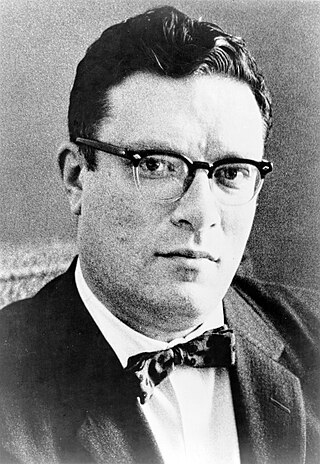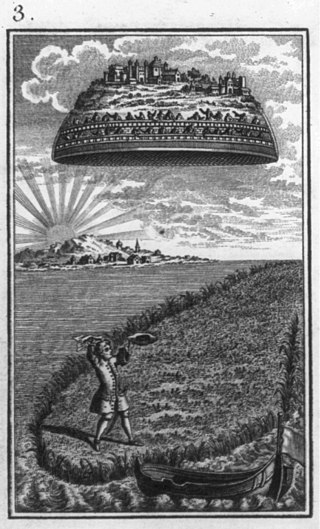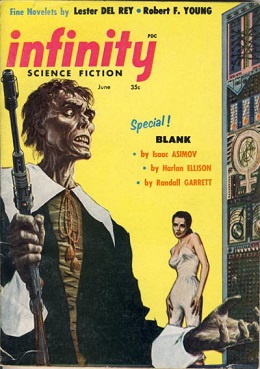Plot summary
Shah Guido G. is the nickname of Guido Garshthavastra, the hereditary Secretary-General of the United Nations ("Sekjen"), a tyrant who rules the Earth from a levitating island called Atlantis.
Philo Plat is an aristocrat who secretly plots Shah Guido G.'s downfall. When he learns that the stations that power the Sky-Island's anti-gravitational beams are close to critical, Plat convinces Shah Guido G. to order in a division of Waves (female shock-troops whose name derives from the WAVES of the United States Navy) to put down a supposed rebellion by the technicians.
As Plat suspected, the weight of the Waves' cruisers is sufficient to overload the Sky-Island's power generators, causing it to plummet to the ground, thereby liberating the people from tyranny. The story ends with the punning punchline: "Why, once more in history, Atlantis sank beneath the Waves."

Isaac Asimov was an American writer and professor of biochemistry at Boston University. During his lifetime, Asimov was considered one of the "Big Three" science fiction writers, along with Robert A. Heinlein and Arthur C. Clarke. A prolific writer, he wrote or edited more than 500 books. He also wrote an estimated 90,000 letters and postcards. Best known for his hard science fiction, Asimov also wrote mysteries and fantasy, as well as popular science and other non-fiction.

In its original sense, a shaggy-dog story or yarn is an extremely long-winded anecdote characterized by extensive narration of typically irrelevant incidents and terminated by an anticlimax. In other words, it is a long story that is intended to be amusing and that has an intentionally silly or meaningless ending.
This is a bibliography of the books written or edited by Isaac Asimov, arranged alphabetically. Asimov was a prolific author, and he engaged in many collaborations with other authors. This list may not yet be complete. The total number of books listed here is over 500. Asimov died in 1992 at age 72; a small number of his books were published posthumously.

Buy Jupiter and Other Stories is a 1975 collection of short stories by American writer Isaac Asimov. Each story is introduced by a short account of how it came to be written and what was happening in Asimov's life at the time, and follows on from where The Early Asimov (1972) left off. In the introduction, Asimov explains that his objective is to tell enough of his autobiography in his short story collections so that his editors will stop asking him to write an actual autobiography.
A feghoot is a humorous short story or vignette ending in a pun, where the story contains sufficient context to recognize the punning humor.

In science fiction and fantasy, floating cities and islands are a common trope, ranging from cities and islands that float on water to ones that float in the atmosphere of a planet by purported scientific technologies or by magical means. While very large floating structures have been constructed or proposed in real life, aerial cities and islands remain in the realm of fiction.

"Everest" is a science fiction short story by American writer Isaac Asimov. It was first published in the December 1953 issue of Universe Science Fiction and reprinted in the 1975 collection Buy Jupiter and Other Stories. Asimov wrote the story in one sitting while visiting the Chicago, Illinois editorial offices of Universe on 7 April 1953.
"Buy Jupiter!" is a humorous science fiction short story by American writer Isaac Asimov. It was first published in the May 1958 issue of Venture Science Fiction Magazine, and reprinted in the 1975 collection Buy Jupiter and Other Stories. The original title of the story was "It Pays," though it was never published under this name.
"Button, Button" is a science fiction short story by American writer Isaac Asimov. The story first appeared in a January 1953 issue of Startling Stories and was reprinted in the 1975 collection Buy Jupiter and Other Stories. It is one of several stories by Asimov in which he deliberately set out to be funny.
"Let's Not" is a science fiction short story by American writer Isaac Asimov. It was first published in Boston University Graduate Journal in December 1954. It was written for no payment as a favor to the journal, and later appeared in the 1975 collection Buy Jupiter and Other Stories.
"Take a Match" is a science fiction short story by American writer Isaac Asimov. It was first published in Robert Silverberg's 1972 anthology New Dimensions II and reprinted in the 1975 Asimov collection Buy Jupiter and Other Stories.
"Light Verse" is a science fiction short story by American writer Isaac Asimov. It was first published in the September–October 1973 issue of The Saturday Evening Post. It later appeared in the collections Buy Jupiter and Other Stories (1975), The Complete Robot (1982), and Robot Dreams (1986). The author has reported that he wrote the initial draft in one session and later had to change hardly a word in the final revision.

"Rain, Rain, Go Away" is a short story by American writer Isaac Asimov. A fantasy/horror story, it was based on an idea by Bob Mills, editor of The Magazine of Fantasy and Science Fiction, but rejected by him. It was instead published in the September 1959 issue of Fantastic Universe and reprinted in the 1975 collection Buy Jupiter and Other Stories.

"Blank!" is a science fiction short story by American writer Isaac Asimov. It was commissioned by Larry Shaw, editor of Infinity Science Fiction, as being the least inspirational title on which to base a story. Harlan Ellison and Randall Garrett were also invited to submit stories based on the same title; Garrett wrote one with "Blank?" as the title while Ellison submitted "Blank." All three were published in the magazine in June 1957. Asimov's story was later reprinted in the 1975 collection Buy Jupiter and Other Stories.
"The Proper Study" is a science fiction short story by American writer Isaac Asimov. Inspired by a painting of a head surrounded by random psychedelic designs, it was commissioned by Boys' Life, and published in the September 1968 issue. The Proper Study was reprinted in the 1975 collection Buy Jupiter and Other Stories.
"Exile to Hell" is a science fiction short story by American writer Isaac Asimov. It appeared in the May 1968 issue of Analog Science Fiction and Fact and was included in the 1975 collection Buy Jupiter and Other Stories.
"2430 A.D." is a science fiction short story by the American writer Isaac Asimov. It first appeared in the October 1970 issue of Think, the IBM house magazine, and was reprinted in Asimov's 1975 collection Buy Jupiter and Other Stories.
"The Greatest Asset" is a science fiction short story by American writer Isaac Asimov. It was written as a counterpoint to his story "2430 A.D." with the intention of refuting, rather than illustrating, the same quotation by writer and social commentator J. B. Priestley from his 1957 book Thoughts in the Wilderness. It was published in the January 1972 issue of Analog and reprinted in the 1975 collection Buy Jupiter and Other Stories.
"Silly Asses" is a science fiction short story by American writer Isaac Asimov. It was published in the February 1958 issue of Future Science Fiction, after having been twice rejected by other outlets. It was subsequently included in the collections Have You Seen These? in 1974 and Buy Jupiter and Other Stories in 1975. It runs to less than two pages in paperback.
Isaac Asimov wrote three volumes of autobiography. In Memory Yet Green (1979) and In Joy Still Felt (1980) were a two-volume work, covering his life up to 1978. The third volume, I. Asimov: A Memoir (1994), published after his death, was not a sequel but a new work which covered his whole life. This third book won a Hugo Award.






